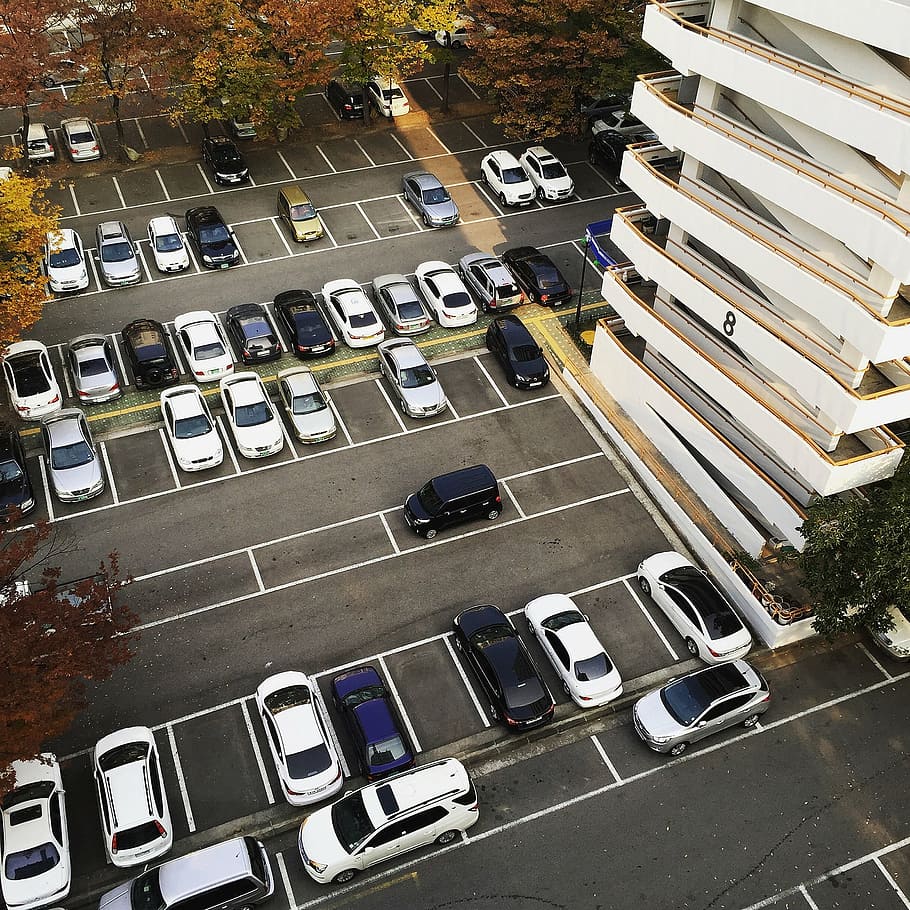
May 06, 2020
As Parking Reforms Show Progress, COVID-19 Suspends Regulations
Before the pandemic hit, there was growing momentum in cities around the world for a host of traffic reduction measures. Congestion pricing was finally front-and-center on the agenda of cities from New York to Mumbai; Los Angeles launched planning efforts for a low-emissions zone; and major cities such as Mexico City and Rio de Janeiro had passed groundbreaking parking reform measures. Will temporary relaxation of these measures lead to permanent rollbacks?
In the last month, coronavirus-induced shutdowns have radically changed the day-to-day function of cities. Around the world, there is enormous pressure to relax codes and rules around car travel and parking in an attempt to make life a little easier for stressed-out residents. London and Singapore have suspended congestion pricing. Boston and Los Angeles have relaxed enforcement of parking restrictions. In most cases, these were thought to be temporary measures, but with no end in sight for the current crisis, cities around the world run the risk losing these policy gains permanently by continuing to relax restrictions. Ironically, this is happening just as we were starting to see some significant, positive impacts of policies designed to manage car travel.
Over the last century, city parking policies have established parking minimums for construction, requiring every new building to have at least a certain amount of parking (often a parking space for every residential unit). These requirements force builders to create parking, even when there is not market demand for it. This drives down the cost of parking and turns it into a major subsidy for people who own cars. Eventually, these parking minimums lead to other behavior: they encourage people to drive when they would otherwise choose to walk, bicycle, or take public transit.
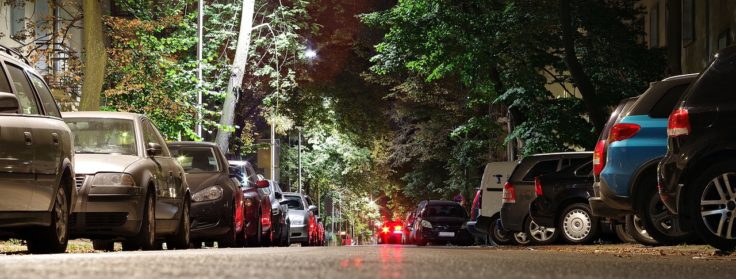
To many city residents, parking policies are the province of dusty zoning regulations and engineering manuals, of little consequence to their daily lives. Transport and urban planning advocates know that over decades these policies and their implications have enormous impacts on cities and their residents’ lives. Abundant free parking leads to more driving, and more driving leads to more greenhouse gas emissions, more expensive housing, air pollution, and more dangerous streets, especially for children and the elderly. Inversely, setting limits on parking, as Mexico City and Rio de Janeiro have recently done, reduces driving, increases cycling and walking, and makes cities more sustainable, economically inclusive, and livable.
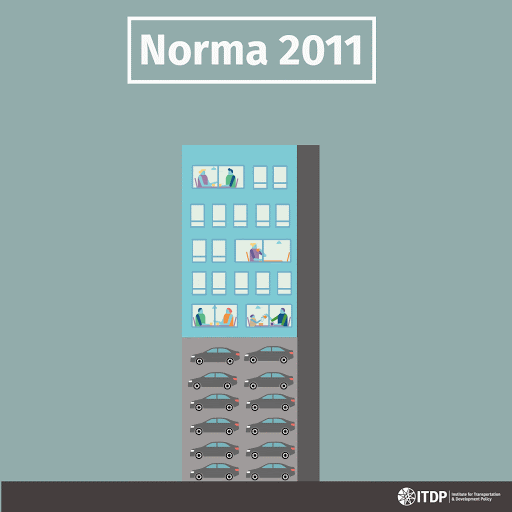
ITDP’s advocacy and policy guidance in Mexico and Brazil has led to groundbreaking reform in parking policy that will have major long-term impacts on greenhouse gas emissions. In 2017, Mexico City announced a sweeping policy change that removed minimum requirements for off-street parking construction in new developments across the city, replacing them with new limits on the maximum number of off-street parking spaces that can be built. In 2019, Rio de Janeiro followed suit. These policies will slow climate change and improve air quality by discouraging driving. By reducing construction costs, they will lead to more affordable housing. And by inspiring imitation, they will have ripple effects across Latin America.
Although both policies are showing positive results, they are not equal, or perfect. Mexico City’s policy is broader, affecting all development across the entire city. In addition to setting a limit of one off-street parking space per residential unit, it also sets maximums for office developments, preventing them from building more than one parking space per 30 square meters of office space. Rio de Janeiro’s policy sets more aggressive limits: One off-street space per four residential units, but only applies to areas within 800m of rapid transit, does not apply to office development, and does not apply in the sought-after seaside Barra da Tijuca district.
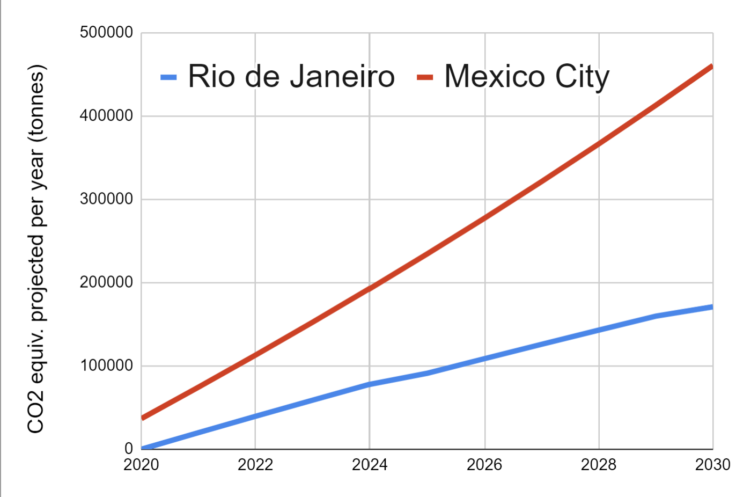
Due to a lack of international model for estimating the impacts of parking reforms, ITDP developed a new method for predicting these impacts on greenhouse gas emissions by synthesizing city-specific information about travel behavior, real estate development patterns, and vehicle emissions standards. With this method, ITDP was able to measure the policies of Rio de Janeiro and Mexico City to find that together, these two policies, if they continue as they were enacted, would result in a cumulative reduction of 3.6 million tons of CO2-equivalent emissions by 2030. Off-street parking policies affect the gradual process of constructing and renovating buildings. That means that the annual impact of parking policy reform grows steadily over time. In fact, by 2050, the combined annual impact of the two policies will be about 4.5 million tons of CO2-equivalent. That’s equivalent to taking about a million cars off the road. Because its policy has a wider application, Mexico City is responsible for the majority of that impact. The reduction in driving will also have major, long-term impacts on air quality and traffic safety.
These policies will also make it easier to build more housing, meaning that housing may become more affordable. Developers will no longer be required to construct large parking garages at great cost, saving both resources and land area for the construction of residential units. Under Mexico City’s old regulation, an average apartment building would be composed of 42% parking and 58% livable space. With the reformed policy, an average new building has 33% parking and 67% livable space. For the same cost of construction, there is more space for people.
Parking reform synergizes with other policies and projects in sustainable transportation. It facilitates denser development, which makes rapid transit more efficient and helps people to walk and bicycle to their destinations, further reducing the climate impacts of travel. It may reduce urban sprawl into the countryside, protect the natural environment and decrease the need for costly maintenance of highways and other infrastructure.
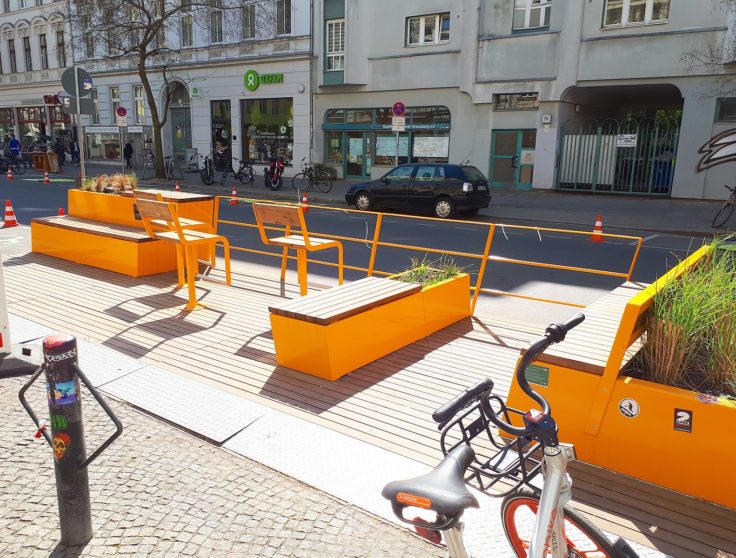
Mexico City and Rio de Janeiro, as the first major Latin American cities to embrace parking reform, became innovators, crossing the crucial first threshold in the diffusion of this impactful best practice across the entire region. Now more than ever, it is crucial that they continue that progress. There is so much to gain with these policies, and so much more to lose by backpedaling on reforms like these for the short term convenience for a minority of car owners. Mexico City and Rio de Janeiro can continue to act as leaders, so that other cities will be able to see the successes of parking reform: greater benefits for human health, housing affordability, street space for people, and the climate. Now more than ever, we must ensure that these policies and others like them continue to grow worldwide.
